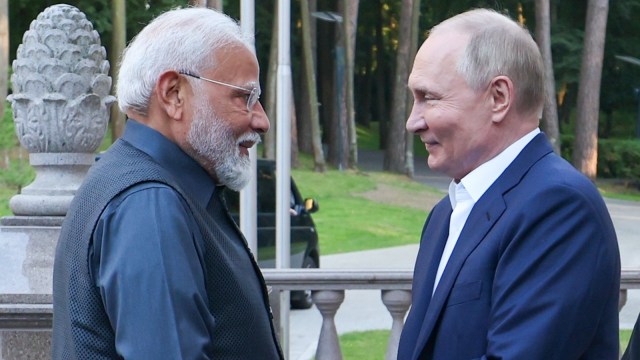India and Russia issued a joint statement underlining that both the countries have remained resilient in the backdrop of the “prevailing complex, challenging and uncertain geopolitical situation”. The statement condemned the terror attacks in Jammu and Kashmir, Dagestan and Moscow and also mentioned setting up a bilateral trade target of USD 100 billion by 2030.
Both sides have strived to forge a “contemporary, balanced, mutually beneficial, sustainable and long-term partnership”, said the statement.

The joint statement agreed between Prime Minister Narendra Modi and Russian President Vladimir Putin “strongly condemned the recent dastardly terrorist attack on an Army convoy in Kathua area of Jammu and Kashmir on July 8, 2024, in Dagestan on June 23 and on the Crocus City Hall in Moscow on March 22” and stressed that “these terrorist attacks are a grim reminder for further strengthening cooperation to combat terrorism”.
They also called for an uncompromising fight against international terrorism and extremism in all their forms and manifestations, noting the importance of increasing cooperation in this area, without hidden agendas and double standards on the solid basis of international law and the UN Charter, the statement said.
Besides, they “stressed the need for firm implementation of relevant resolutions of the UN Security Council, the UN General Assembly, as well as the implementation of the UN Global Counter-Terrorism Strategy”. This is a thinly-veiled reference to Chinese attempts to block listing of Pakistan-based terrorists.
On the economic front, they noted the significant trade growth in 2023 which is around double of the bilateral trade target of USD 30 billion set by the leaders for 2025.
To achieve balanced and sustainable bilateral trade in the long term, “the leaders stressed the need to increase Indian exports to Russia through strengthening industrial cooperation, forging new technological and investment partnerships, especially in advanced high-technology areas and finding new avenues and forms of cooperation”, it said.
Story continues below this ad
Aiming to further accelerate and sustain the growth in bilateral trade, the leaders agreed to set the bilateral trade target of USD 100 billion by 2030, it said. The joint statement said they agreed to development of a bilateral settlement system using national currencies and consistent introduction of digital financial instruments into mutual settlements.
They also agreed to increase “cargo turnover with India through the launch of new routes of the North-South International Transport Corridor, the Northern Sea Route and the Chennai-Vladivostok Sea Line”.They also agreed to increase the volume of bilateral trade in agricultural products, food and fertilizers, the statement said.
The countries also agreed cooperation in key energy sectors, including nuclear energy, oil refining and petrochemicals and expanded forms of cooperation and partnership in the field of energy infrastructure, technologies and equipment.
Both sides agreed to facilitate mutual and international energy security, taking into account the prospects of global energy transition.They also agreed to promote systematic cooperation in the development and supply of medicines and advanced medical equipment. Study of the possibility of opening branches of Indian medical institutions in Russia and recruiting qualified medical personnel as well as strengthening of coordination in the field of medical and biological safety was also agreed upon, the statement said.
Story continues below this ad
They also decided on promotion of investments and joint projects across various sectors of digital economy, science and research, educational exchanges and internships for employees of high-tech companies.









